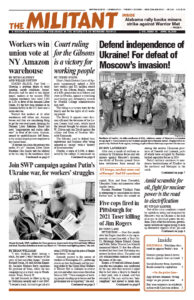Part of the crisis conditions created by capitalism today and deepened by Moscow’s war on Ukraine is the lack of access to electrical power for millions. Days after the invasion, governments worldwide began racing to lock up alternative supplies of oil, gas and coal from non-Russian sources.
President Joseph Biden announced the largest-ever release of oil from the U.S. Strategic Petroleum Reserves March 31, in an attempt to force down soaring prices.
Berlin is scrambling to ramp up coal production and is hunting for other sources of natural gas after its decision to shut down the country’s nuclear plants left Germany’s ruling families utterly dependent on Russian fuel.
The governments of Japan, South Korea and other Asian countries are now vying with European firms to buy U.S. liquefied natural gas supplies.
Working people in the semicolonial countries are left to fend for themselves. The national power grid in Nigeria collapsed last month plunging major cities into darkness for days.
All this comes on top of the widespread discussion, sometimes lapsing into middle-class hysteria, over the need to find alternatives to generating energy by burning fossil fuels.
The labor movement in the United States and other industrialized countries, as a fundamental act of solidarity, should fight to aid the development of electrification worldwide. There is no technical reason why everyone shouldn’t have the power needed for modern schools and hospitals, homes, transport and sanitation. Electrification is an elementary precondition for modern industry and cultural life.
There is an answer to make electricity widely and cheaply available — expanding nuclear power. It produces the greatest amount of energy with the least use of resources and the smallest output of atmospheric pollution. Despite all the rosy predictions by “climate change” business proponents, 75% of the energy used worldwide today comes from coal, oil and gas. These fuels take a huge toll on public health, the health of workers in those industries and on the earth.
Fewer than half of those who live in the world’s least-developed countries today have power. In some areas, including Sub-Saharan Africa, that number is growing.
Some 2.6 billion people worldwide lack enough power for modern appliances. They cook or heat their homes using polluting open fires or simple stoves fueled by kerosene, wood or coal. Each year close to 4 million people die prematurely from illnesses attributable to the resulting household air pollution, causing half of deaths from pneumonia for children under 5 years old.
Without electricity millions are forced to carry water by hand each day, a back-breaking task that largely falls on women and girls.
Widespread use of nuclear power can solve these problems. And safety issues posed by nuclear energy and the disposal of radioactive wastes aren’t immutable facts of nature. They are the product of the capitalist rulers’ disdain for safety in their scramble to maximize profits. Capitalists run all production on this basis. Working people can fight for workers control of production to assure safe operation.
From the earliest stages of class-divided society, the propertied classes have organized labor to advance their private gain with no concern for the social consequences. Capitalists use labor as an expendable beast of burden, while they simultaneously deplete the soil, destroy forests through slash-and-burn or other destructive farming methods, wipe out animal life through overhunting and overfishing, and poison streams, ponds and other bodies of water.
Like all political questions working people confront today, the road to expanding energy production, cleanly and safely, needs to start with the interests of the working class worldwide. We need to fight for concrete steps that can narrow the gap between workers in imperialist and developing countries, and between the exploited classes in urban and rural areas.
Expanding access to electricity and making it affordable was one of the first tasks taken up by working people in Cuba after they took political power in 1959 and made a socialist revolution. Today 99.8% of the population has access. The recent installation of solar panels in remote mountainous areas ensures electricity is available everywhere for schools and light so people can read, discuss, watch television and organize cultural activities at night.
On the road to following the Cubans’ example, working people today need to fight to expand the use of nuclear power to meet the needs of humanity and safeguard the planet.

